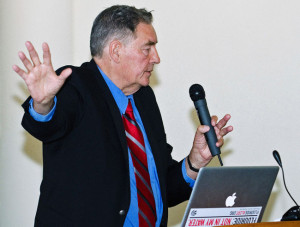Education not fluoridation is the answer.
That’s what Paul Connett believes.
Connett is the founder of Fluoride Action Network, which seeks to broaden awareness about the toxicity of fluoride compounds.
He passionately presented in his stance against fluoridation in drinking water during an information session hosted by Fluoride Free Peterborough at the Peterborough Public Library on Wednesday night.
Fluoride is a natural element found in rocks, soil and water and fluoridation is an increase of the level of fluoride added to drinking water.
The added fluoride comes from a co-product of the phosphate industry.
Activists say the fluoride added is harmful to our health, but health officials say otherwise.
“It’s a contaminated hazardous material from the phosphate fertilizer industry,” said Connett before he spoke at the seminar.
Dr. Rosana Pellizzari, medical officer of health for the Peterborough County-City Health Unit, said it is a highly regulated and purified substance.
“It’s nonsense to characterize it as waste or as a pollutant,” Pellizzari said during a phone interview.
Fluoride has been added to public drinking water supplies around the world for more than half a century, with the aim of assisting dental health.
Peterborough began fluoridation of municipal drinking water in 1973.
“Fluoride makes teeth more resistant to decay and reduces tooth decay in kid’s primary teeth up to 60% and 35% in their secondary teeth,” said Pellizzari.
She went on to say that fluoridation is beneficial to everyone and can reduce a population’s tooth decay by 20% to 40%.
The city adds 0.7 milligrams per litre of concentrated fluoride to its water, which Pellizzari said is closely monitored.
Adding too much fluoride to drinking water can cause dental fluorisis, a condition that causes white spots on teeth because of disturbance to dental enamel, usually seen among children.
“At the levels present in our drinking water, we don’t expect to see fluorisis,” she said, adding that dental fluorosis is not a concern in Canada.
But Connett said adding any amount is dangerous.
“The dose causes harm, not the concentration,” he said.
“Once it’s in the water, you can’t control the dose,” said Connett referencing the fact that people consume different amounts of water.
While Connett said few health studies have been done in Canada to demonstrate the safety of fluoridation, Pellizzari said the benefits are well known, proven and safe.
“There’s lots of excellent, up-to-date scientific information on Health Canada’s website,” she said.
“It’s important for people to know that there is good science being done and the science is strong,” said Pellizzari.
Along with its health benefits, its also cost effective, said Pellizzari.
The cost of fluoridation in water is 38 cents per year, per person and over a lifetime, costs less than a filling, she said.
Instead of spending funds on fluoridation, Connett said he would like to see the money spent toward educating children in low-income families on creating better diets and earlier brushing.
Connett said that putting an end to fluoridation is as easy as turning off a tap, but to turn off that tap you need the political will to do so.
He said his goal in speaking to communities is to get more people educated and organized so they can take action.
“Medical officers in Canada are betraying the public’s trust,” he said.
NOTE: Fluoride Free Peterborough is a committee dedicated to ending the use of fluoride in the city’s water.
Guest speaker Paul Connett addresses the crowd during an information session hosted by Fluoride Free Peterborough at the Peterborough Public Library on Wednesday night. Connett, founded Fluoride Action Network, which seeks to broaden awareness about the toxicity of fluoride compounds. Jessica Nyznik/Peterborough Examiner/QMI Agency

